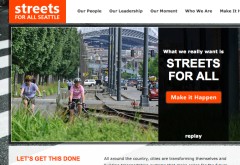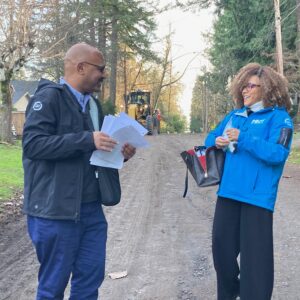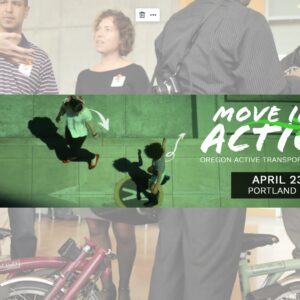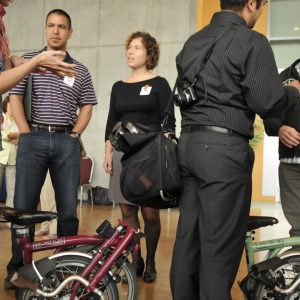
A major campaign has been launched in Seattle to raise money for biking, walking and transit projects. Streets for All Seattle is the result of a new and broad coalition of labor, transportation, and environmental advocacy groups that have come together to pressure city leaders to get serious about paying for multi-modal transportation infrastructure.
There’s a lot of talk swirling around Portland about how to pay for our big active transportation visions; but so far, the talk is happening between high-level advocates and City staff behind closed doors. What we lack is an organized effort to pressure City Hall and an accompanying campaign the general public can rally behind.
“We all recognize there’s a significant gap between the funding we need and the funding we have.”
— David Hiller, Co-Chair of Streets for All Seattle
When Streets for All Seattle launched on Friday, I got in touch with David Hiller. Hiller is the advocacy director of Cascade Bicycle Club and co-chair of the board of Streets for All Seattle. Calling the effort the start of a “big and public discussion,” he said, “We all recognize there’s a significant gap between the funding we need and the funding we have.”
In a letter to Seattle Mayor Mike McGinn and city council, the 24 members of the Streets for All Seattle coalition said they are seeking dedicated funding mechanisms to generate at least $30 million dollars in annual revenue for active transportation projects.
The campaign is likely to result in the formation of a bond measure effort similar to Seattle’s “Bridging the Gap” transportation funding initiative that voters passed four years ago.
Like Seattle, Portland desperately needs to figure out a sustainable funding source to build our long list of urban trails, bikeways, and other multi-modal transportation projects. Hopefully this effort from Seattle will provide some inspiration to finally make it happen.







Thanks for reading.
BikePortland has served this community with independent community journalism since 2005. We rely on subscriptions from readers like you to survive. Your financial support is vital in keeping this valuable resource alive and well.
Please subscribe today to strengthen and expand our work.
This is really great to see. One thing that I would add to this discussion is some sort of mention of “The Intertwine” that Metro is pursuing.
At face value, it seems to me that Seattle’s quest for multi-modal funding is taking a more broader approach than The Intertwine. Which approach is more palatable to the voters that will end up paying for these transportation improvements? Which method can help further our desired outcomes in the long term?
Perhaps a meeting between advocacy organizations in Seattle and Portland is in order. I’d like to see how they are going about formulating these sorts of initiatives.
The talk I heard in Portland is to start selling bottled water to support the bike projects
but, I thought that Seattle Likes bikes!
have you ever rode a bike in Seattle?
It has very steep hills
“have you ever rode a bike in Seattle?”
when i lived in seattle i commuted up capitol hill every evening. my current commute is far more strenuous.
is not anywhere close to as many hills in portland than seattle
eric: Oh, Seattle likes bikes, all right, it just has a hard time doing anything really constructive to make them practical. Lip service, sure, but useful action, not so much. It tends to take about ten years of strenuous advocacy to get 1-5 miles of separated trail, at which point there is much rejoicing, and the next ten year battle begins. Me, I ride anyway, but it’s hard for a lot of folks.
I was visiting Denver for a conference in January, staying near the Stapelton Center area, and managed to pick up a local neighborhood newspaper. Denver is doing the same thing with “active” transportation. Their focus will be on improving bike, pedestrian, and even wheelchair “modes” of moving people around, and not building more lanes for cars.
elaine- are you talking about building sidewalks for wheelchairs?
By the way- did you hear that they are building a giant fallout shelter under the denver airport. there is no publicity about it, they have been working on it for years.